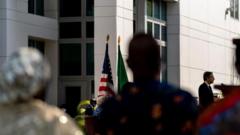As U.S. President Trump expresses frustration over Russia's actions in Ukraine, Kremlin spokesperson Dmitry Peskov downplays concerns. Meanwhile, the Russian media reflects a growing dissatisfaction with Trump, contrasting the earlier optimism about U.S.-Russia relations.
Moscow Responds to Trump's Frustration as U.S.-Russia Relations Chill

Moscow Responds to Trump's Frustration as U.S.-Russia Relations Chill
Kremlin officials remain unfazed by the U.S. president's recent criticism, but Russian media show a stark shift in tone towards the Trump administration.
In recent developments, tensions between the United States and Russia seem to be escalating, with President Donald Trump expressing strong dissatisfaction with the lack of progress on addressing the ongoing conflict in Ukraine. This shift has brought about a notable reaction from Moscow, particularly in light of Trump's criticisms during a recent cabinet meeting, where he alluded to being overwhelmed by "bullshit" thrown by Russian President Vladimir Putin.
The Kremlin's response was marked by a calm demeanor, with spokesperson Dmitry Peskov indicating that they remain committed to pursuing dialogue with Washington despite Trump's heated commentary. "Trump's way of talking is generally quite harsh," Peskov stated in a press conference for journalists, maintaining that the Kremlin hopes for diplomatic engagement to mend fractured relations.
In a stark contrast to this official tone, Russian media outlets have begun to adopt a more critical view of the Trump administration. The Komsomolskaya Pravda newspaper noted Trump’s inconsistent foreign policy stance, comparing him to someone who frequently changes shoes. The tabloid Moskovsky Komsomolets described him as exhibiting a “mercurial temperament,” implying unpredictability in his diplomatic strategy.
A sore point remains the failure to negotiate a ceasefire in Ukraine, a sentiment echoed by Trump himself, who commented on the state of negotiations after a recent phone conversation with Putin. This marked their sixth call this year, yet the U.S. president admitted that "we didn't make any progress" toward resolving the conflict.
Interestingly, only a few months ago, there was an optimistic outlook in Russia regarding the potential for improved relations with the Trump administration. Russian political analysts had previously lauded Trump's stance as advantageous for Moscow, fueling expectations for better cooperation. However, recent months have witnessed a downturn, with halted bilateral talks and a notable absence of dialogue surrounding diplomatic missions.
As the situation develops, speculation rises around whether a deeper geopolitical miscalculation exists on Russia's part, as some reports suggest that Putin perceives a strategic advantage in prolonging hostilities over Ukraine for further concessions. Much relies on Trump’s next steps concerning military aid to Ukraine and potential sanctions against Russia, making following the unfolding narrative essential for those invested in international relations.
The Kremlin's response was marked by a calm demeanor, with spokesperson Dmitry Peskov indicating that they remain committed to pursuing dialogue with Washington despite Trump's heated commentary. "Trump's way of talking is generally quite harsh," Peskov stated in a press conference for journalists, maintaining that the Kremlin hopes for diplomatic engagement to mend fractured relations.
In a stark contrast to this official tone, Russian media outlets have begun to adopt a more critical view of the Trump administration. The Komsomolskaya Pravda newspaper noted Trump’s inconsistent foreign policy stance, comparing him to someone who frequently changes shoes. The tabloid Moskovsky Komsomolets described him as exhibiting a “mercurial temperament,” implying unpredictability in his diplomatic strategy.
A sore point remains the failure to negotiate a ceasefire in Ukraine, a sentiment echoed by Trump himself, who commented on the state of negotiations after a recent phone conversation with Putin. This marked their sixth call this year, yet the U.S. president admitted that "we didn't make any progress" toward resolving the conflict.
Interestingly, only a few months ago, there was an optimistic outlook in Russia regarding the potential for improved relations with the Trump administration. Russian political analysts had previously lauded Trump's stance as advantageous for Moscow, fueling expectations for better cooperation. However, recent months have witnessed a downturn, with halted bilateral talks and a notable absence of dialogue surrounding diplomatic missions.
As the situation develops, speculation rises around whether a deeper geopolitical miscalculation exists on Russia's part, as some reports suggest that Putin perceives a strategic advantage in prolonging hostilities over Ukraine for further concessions. Much relies on Trump’s next steps concerning military aid to Ukraine and potential sanctions against Russia, making following the unfolding narrative essential for those invested in international relations.




















